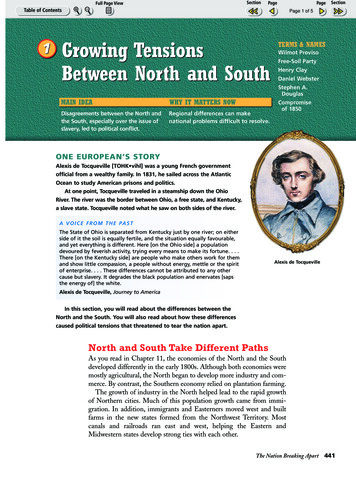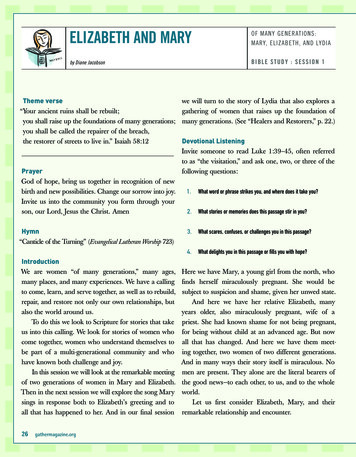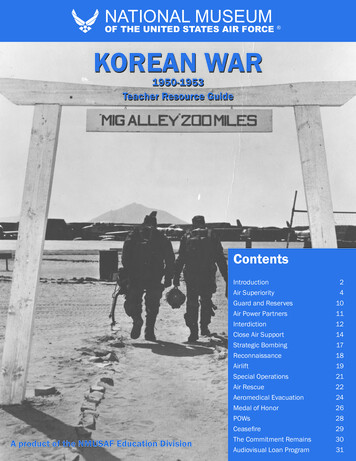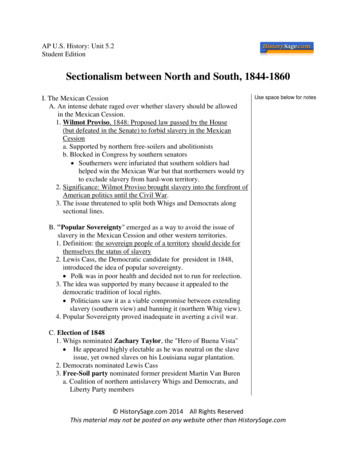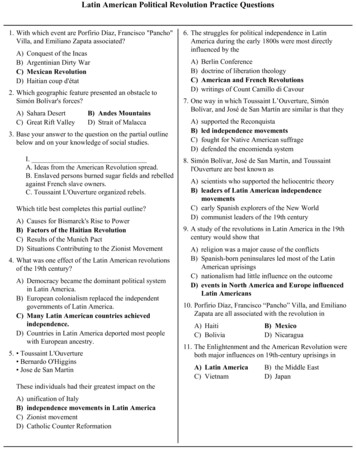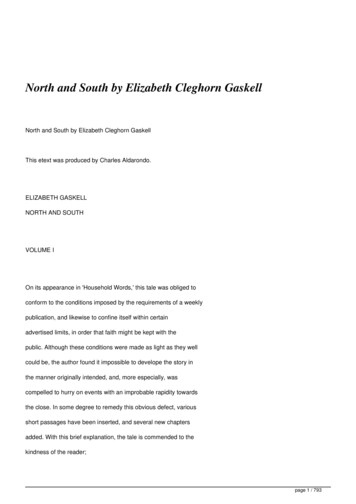
Transcription
North and South by Elizabeth Cleghorn GaskellNorth and South by Elizabeth Cleghorn GaskellThis etext was produced by Charles Aldarondo.ELIZABETH GASKELLNORTH AND SOUTHVOLUME IOn its appearance in 'Household Words,' this tale was obliged toconform to the conditions imposed by the requirements of a weeklypublication, and likewise to confine itself within certainadvertised limits, in order that faith might be kept with thepublic. Although these conditions were made as light as they wellcould be, the author found it impossible to develope the story inthe manner originally intended, and, more especially, wascompelled to hurry on events with an improbable rapidity towardsthe close. In some degree to remedy this obvious defect, variousshort passages have been inserted, and several new chaptersadded. With this brief explanation, the tale is commended to thekindness of the reader;page 1 / 793
'Beseking hym lowly, of mercy and pite, Of its rude makyng tohave compassion.'CHAPTER I'HASTE TO THE WEDDING''Wooed and married and a'.''Edith!' said Margaret, gently, 'Edith!'But, as Margaret half suspected, Edith had fallen asleep. She laycurled up on the sofa in the back drawing-room in Harley Street,looking very lovely in her white muslin and blue ribbons. IfTitania had ever been dressed in white muslin and blue ribbons,and had fallen asleep on a crimson damask sofa in a backdrawing-room, Edith might have been taken for her. Margaret wasstruck afresh by her cousin s beauty. They had grown up togetherfrom childhood, and all along Edith had been remarked upon byevery one, except Margaret, for her prettiness; but Margaret hadnever thought about it until the last few days, when the prospectof soon losing her companion seemed to give force to every sweetquality and charm which Edith possessed. They had been talkingabout wedding dresses, and wedding ceremonies; and Captainpage 2 / 793
Lennox, and what he had told Edith about her future life atCorfu, where his regiment was stationed; and the difficulty ofkeeping a piano in good tune (a difficulty which Edith seemed toconsider as one of the most formidable that could befall her inher married life), and what gowns she should want in the visitsto Scotland, which would immediately succeed her marriage; butthe whispered tone had latterly become more drowsy; and Margaret,after a pause of a few minutes, found, as she fancied, that inspite of the buzz in the next room, Edith had rolled herself upinto a soft ball of muslin and ribbon, and silken curls, and goneoff into a peaceful little after-dinner nap.Margaret had been on the point of telling her cousin of some ofthe plans and visions which she entertained as to her future lifein the country parsonage, where her father and mother lived; andwhere her bright holidays had always been passed, though for thelast ten years her aunt Shaw's house had been considered as herhome. But in default of a listener, she had to brood over thechange in her life silently as heretofore. It was a happybrooding, although tinged with regret at being separated for anindefinite time from her gentle aunt and dear cousin. As shethought of the delight of filling the important post of onlydaughter in Helstone parsonage, pieces of the conversation out ofthe next room came upon her ears. Her aunt Shaw was talking tothe five or six ladies who had been dining there, and whosehusbands were still in the dining-room. They were the familiaracquaintances of the house; neighbours whom Mrs. Shaw calledpage 3 / 793
friends, because she happened to dine with them more frequentlythan with any other people, and because if she or Edith wantedanything from them, or they from her, they did not scruple tomake a call at each other's houses before luncheon. These ladiesand their husbands were invited, in their capacity of friends, toeat a farewell dinner in honour of Edith's approaching marriage.Edith had rather objected to this arrangement, for Captain Lennoxwas expected to arrive by a late train this very evening; but,although she was a spoiled child, she was too careless and idleto have a very strong will of her own, and gave way when shefound that her mother had absolutely ordered those extradelicacies of the season which are always supposed to beefficacious against immoderate grief at farewell dinners. Shecontented herself by leaning back in her chair, merely playingwith the food on her plate, and looking grave and absent; whileall around her were enjoying the mots of Mr. Grey, the gentlemanwho always took the bottom of the table at Mrs. Shaw's dinnerparties, and asked Edith to give them some music in thedrawing-room. Mr. Grey was particularly agreeable over thisfarewell dinner, and the gentlemen staid down stairs longer thanusual. It was very well they did--to judge from the fragments ofconversation which Margaret overheard.'I suffered too much myself; not that I was not extremely happywith the poor dear General, but still disparity of age is adrawback; one that I was resolved Edith should not have toencounter. Of course, without any maternal partiality, I foresawpage 4 / 793
that the dear child was likely to marry early; indeed, I hadoften said that I was sure she would be married before she wasnineteen. I had quite a prophetic feeling when CaptainLennox'--and here the voice dropped into a whisper, but Margaretcould easily supply the blank. The course of true love in Edith'scase had run remarkably smooth. Mrs. Shaw had given way to thepresentiment, as she expressed it; and had rather urged on themarriage, although it was below the expectations which many ofEdith's acquaintances had formed for her, a young and prettyheiress. But Mrs. Shaw said that her only child should marry forlove,--and sighed emphatically, as if love had not been hermotive for marrying the General. Mrs. Shaw enjoyed the romance ofthe present engagement rather more than her daughter. Not butthat Edith was very thoroughly and properly in love; still shewould certainly have preferred a good house in Belgravia, to allthe picturesqueness of the life which Captain Lennox described atCorfu. The very parts which made Margaret glow as she listened,Edith pretended to shiver and shudder at; partly for the pleasureshe had in being coaxed out of her dislike by her fond lover, andpartly because anything of a gipsy or make-shift life was reallydistasteful to her. Yet had any one come with a fine house, and afine estate, and a fine title to boot, Edith would still haveclung to Captain Lennox while the temptation lasted; when it wasover, it is possible she might have had little qualms ofill-concealed regret that Captain Lennox could not have united inhis person everything that was desirable. In this she was but hermother's child; who, after deliberately marrying General Shawwith no warmer feeling than respect for his character andpage 5 / 793
establishment, was constantly, though quietly, bemoaning her hardlot in being united to one whom she could not love.'I have spared no expense in her trousseau,' were the next wordsMargaret heard.'She has all the beautiful Indian shawls and scarfs the Generalgave to me, but which I shall never wear again.''She is a lucky girl,' replied another voice, which Margaret knewto be that of Mrs. Gibson, a lady who was taking a doubleinterest in the conversation, from the fact of one of herdaughters having been married within the last few weeks.'Helen had set her heart upon an Indian shawl, but really when Ifound what an extravagant price was asked, I was obliged torefuse her. She will be quite envious when she hears of Edithhaving Indian shawls. What kind are they? Delhi? with the lovelylittle borders?'Margaret heard her aunt's voice again, but this time it was as ifshe had raised herself up from her half-recumbent position, andwere looking into the more dimly lighted back drawing-room.'Edith! Edith!' cried she; and then she sank as if wearied by theexertion. Margaret stepped forward.page 6 / 793
'Edith is asleep, Aunt Shaw. Is it anything I can do?'All the ladies said 'Poor child!' on receiving this distressingintelligence about Edith; and the minute lap-dog in Mrs. Shaw'sarms began to bark, as if excited by the burst of pity.'Hush, Tiny! you naughty little girl! you will waken yourmistress. It was only to ask Edith if she would tell Newton tobring down her shawls: perhaps you would go, Margaret dear?'Margaret went up into the old nursery at the very top of thehouse, where Newton was busy getting up some laces which wererequired for the wedding. While Newton went (not without amuttered grumbling) to undo the shawls, which had already beenexhibited four or five times that day, Margaret looked round uponthe nursery; the first room in that house with which she hadbecome familiar nine years ago, when she was brought, all untamedfrom the forest, to share the home, the play, and the lessons ofher cousin Edith. She remembered the dark, dim look of the Londonnursery, presided over by an austere and ceremonious nurse, whowas terribly particular about clean hands and torn frocks. Sherecollected the first tea up there--separate from her father andaunt, who were dining somewhere down below an infinite depth ofstairs; for unless she were up in the sky (the child thought),they must be deep down in the bowels of the earth. Atpage 7 / 793
home--before she came to live in Harley Street--her mother'sdressing-room had been her nursery; and, as they kept early hoursin the country parsonage, Margaret had always had her meals withher father and mother. Oh! well did the tall stately girl ofeighteen remember the tears shed with such wild passion of griefby the little girl of nine, as she hid her face under thebed-clothes, in that first night; and how she was bidden not tocry by the nurse, because it would disturb Miss Edith; and howshe had cried as bitterly, but more quietly, till her newly-seen,grand, pretty aunt had come softly upstairs with Mr. Hale to showhim his little sleeping daughter. Then the little Margaret hadhushed her sobs, and tried to lie quiet as if asleep, for fear ofmaking her father unhappy by her grief, which she dared notexpress before her aunt, and which she rather thought it waswrong to feel at all after the long hoping, and planning, andcontriving they had gone through at home, before her wardrobecould be arranged so as to suit her. grander circumstances, andbefore papa could leave his parish to come up to London, even fora few days.Now she had got to love the old nursery, though it was but adismantled place; and she looked all round, with a kind ofcat-like regret, at the idea of leaving it for ever in threedays.'Ah Newton!' said she, 'I think we shall all be sorry to leavethis dear old room.'page 8 / 793
'Indeed, miss, I shan't for one. My eyes are not so good as theywere, and the light here is so bad that I can't see to mend lacesexcept just at the window, where there's always a shockingdraught--enough to give one one's death of cold.'Well, I dare say you will have both good light and plenty ofwarmth at Naples. You must keep as much of your darning as youcan till then. Thank you, Newton, I can take them down--you'rebusy.'So Margaret went down laden with shawls, and snuffing up theirspicy Eastern smell. Her aunt asked her to stand as a sort of layfigure on which to display them, as Edith was still asleep. Noone thought about it; but Margaret's tall, finely made figure, inthe black silk dress which she was wearing as mourning for somedistant relative of her father's, set off the long beautifulfolds of the gorgeous shawls that would have half-smotheredEdith. Margaret stood right under the chandelier, quite silentand passive, while her aunt adjusted the draperies. Occasionally,as she was turned round, she caught a glimpse of herself in themirror over the chimney-piece, and smiled at her own appearancethere-the familiar features in the usual garb of a princess. Shetouched the shawls gently as they hung around her, and took apleasure in their soft feel and their brilliant colours, andrather liked to be dressed in such splendour--enjoying it much aspage 9 / 793
a child would do, with a quiet pleased smile on her lips. Justthen the door opened, and Mr. Henry Lennox was suddenlyannounced. Some of the ladies started back, as if half-ashamed oftheir feminine interest in dress. Mrs. Shaw held out her hand tothe new-comer; Margaret stood perfectly still, thinking she mightbe yet wanted as a sort of block for the shawls; but looking atMr. Lennox with a bright, amused face, as if sure of his sympathyin her sense of the ludicrousness at being thus surprised.Her aunt was so much absorbed in asking Mr. Henry Lennox--who hadnot been able to come to dinner--all sorts of questions about hisbrother the bridegroom, his sister the bridesmaid (coming withthe Captain from Scotland for the occasion), and various othermembers of the Lennox family, that Margaret saw she was no morewanted as shawl-bearer, and devoted herself to the amusement ofthe other visitors, whom her aunt had for the moment forgotten.Almost immediately, Edith came in from the back drawing-room,winking and blinking her eyes at the stronger light, shaking backher slightly-ruffled curls, and altogether looking like theSleeping Beauty just startled from her dreams. Even in herslumber she had instinctively felt that a Lennox was worthrousing herself for; and she had a multitude of questions to askabout dear Janet, the future, unseen sister-in-law, for whom sheprofessed so much affection, that if Margaret had not been veryproud she might have almost felt jealous of the mushroom rival.As Margaret sank rather more into the background on her aunt'sjoining the conversation, she saw Henry Lennox directing his lookpage 10 / 793
towards a vacant seat near her; and she knew perfectly well thatas soon as Edith released him from her questioning, he would takepossession of that chair. She had not been quite sure, from heraunt's rather confused account of his engagements, whether hewould come that night; it was almost a surprise to see him; andnow she was sure of a pleasant evening. He liked and dislikedpretty nearly the same things that she did. Margaret's face waslightened up into an honest, open brightness. By-and-by he came.She received him with a smile which had not a tinge of shyness orself-consciousness in it.'Well, I suppose you are all in the depths of business--ladies'business, I mean. Very different to my business, which is thereal true law business. Playing with shawls is very differentwork to drawing up settlements.'Ah, I knew how you would be amused to find us all so occupied inadmiring finery. But really Indian shawls are very perfect thingsof their kind.''I have no doubt they are. Their prices are very perfect, too.Nothing wanting.' The gentlemen came dropping in one by one, andthe buzz and noise deepened in tone.'This is your last dinner-party, is it not? There are no morebefore Thursday?'page 11 / 793
'No. I think after this evening we shall feel at rest, which I amsure I have not done for many weeks; at least, that kind of restwhen the hands have nothing more to do, and all the arrangementsare complete for an event which must occupy one's head and heart.I shall be glad to have time to think, and I am sure Edith will.''I am not so sure about her; but I can fancy that you will.whenever I have seen you lately, you have been carried away by awhirlwind of some other person's making.''Yes,' said Margaret, rather sadly, remembering the never-endingcommotion about trifles that had been going on for more than amonth past: 'I wonder if a marriage must always be preceded bywhat you call a whirlwind, or whether in some cases there mightnot rather be a calm and peaceful time just before it.''Cinderella's godmother ordering the trousseau, thewedding-breakfast, writing the notes of invitation, forinstance,' said Mr. Lennox, laughing.'But are all these quite necessary troubles?' asked Margaret,looking up straight at him for an answer. A sense ofindescribable weariness of all the arrangements for a prettyeffect, in which Edith had been busied as supreme authority forpage 12 / 793
the last six weeks, oppressed her just now; and she really wantedsome one to help her to a few pleasant, quiet ideas connectedwith a marriage.'Oh, of course,' he replied with a change to gravity in his tone.'There are forms and ceremonies to be gone through, not so muchto satisfy oneself, as to stop the world's mouth, without whichstoppage there would be very little satisfaction in life. But howwould you have a wedding arranged?''Oh, I have never thought much about it; only I should like it tobe a very fine summer morning; and I should like to walk tochurch through the shade of trees; and not to have so manybridesmaids, and to have no wedding-breakfast. I dare say I amresolving against the very things that have given me the mosttrouble just now.''No, I don't think you are. The idea of stately simplicityaccords well with your character.'Margaret did not quite like this speech; she winced away from itmore, from remembering former occasions on which he had tried tolead her into a discussion (in which he took the complimentarypart) about her own character and ways of going on. She cut hisspeech rather short by saying:page 13 / 793
'It is natural for me to think of Helstone church, and the walkto it, rather than of driving up to a London church in the middleof a paved street.''Tell me about Helstone. You have never described it to me. Ishould like to have some idea of the place you will be living in,when ninety-six Harley Street will be looking dingy and dirty,and dull, and shut up. Is Helstone a village, or a town, in thefirst place?''Oh, only a hamlet; I don't think I could call it a village atall. There is the church and a few houses near it on thegreen--cottages, rather--with roses growing all over them.''And flowering all the year round, especially at Christmas--makeyour picture complete,' said he.'No,' replied Margaret, somewhat annoyed, 'I am not making apicture. I am trying to describe Helstone as it really is. Youshould not have said that.''I am penitent,' he answered. 'Only it really sounded like avillage in a tale rather than in real life.'page 14 / 793
'And so it is,' replied Margaret, eagerly. 'All the other placesin England that I have seen seem so hard and prosaic-looking,after the New Forest. Helstone is like a village in a poem--inone of Tennyson's poems. But I won't try and describe it anymore. You would only laugh at me if I told you what I think ofit--what it really is.''Indeed, I would not. But I see you are going to be veryresolved. Well, then, tell me that which I should like stillbetter to know what the parsonage is like.''Oh, I can't describe my home. It is home, and I can't put itscharm into words.''I submit. You are rather severe to-night, Margaret.'How?' said she, turning her large soft eyes round full upon him.'I did not know I was.''Why, because I made an unlucky remark, you will neither tell mewhat Helstone is like, nor will you say anything about your home,though I have told you how much I want to hear about both, thelatter especially.'page 15 / 793
'But indeed I cannot tell you about my own home. I don't quitethink it is a thing to be talked about, unless you knew it.''Well, then'--pausing for a moment--'tell me what you do there.Here you read, or have lessons, or otherwise improve your mind,till the middle of the day; take a walk before lunch, go a drivewith your aunt after, and have some kind of engagement in theevening. There, now fill up your day at Helstone. Shall you ride,drive, or walk?''Walk, decidedly. We have no horse, not even for papa. He walksto the very extremity of his parish. The walks are so beautiful,it would be a shame to drive--almost a shame to ride.''Shall you garden much? That, I believe, is a proper employmentfor young ladies in the country.''I don't know. I am afraid I shan't like such hard work.''Archery parties--pic-nics--race-balls--hunt-balls?''Oh no!' said she, laughing. 'Papa's living is very small; andeven if we were near such things, I doubt if I should go tothem.'page 16 / 793
'I see, you won't tell me anything. You will only tell me thatyou are not going to do this and that. Before the vacation ends,I think I shall pay you a call, and see what you really do employyourself in.''I hope you will. Then you will see for yourself how beautifulHelstone is. Now I must go. Edith is sitting down to play, and Ijust know enough of music to turn over the leaves for her; andbesides, Aunt Shaw won't like us to talk.' Edith playedbrilliantly. In the middle of the piece the door half-opened, andEdith saw Captain Lennox hesitating whether to come in. She threwdown her music, and rushed out of the room, leaving Margaretstanding confused and blushing to explain to the astonishedguests what vision had shown itself to cause Edith's suddenflight. Captain Lennox had come earlier than was expected; or wasit really so late? They looked at their watches, were dulyshocked, and took their leave.Then Edith came back, glowing with pleasure, half-shyly,half-proudly leading in her tall handsome Captain. His brothershook hands with him, and Mrs. Shaw welcomed him in her gentlekindly way, which had always something plaintive in it, arisingfrom the long habit of considering herself a victim to anuncongenial marriage. Now that, the General being gone, she hadevery good of life, with as few drawbacks as possible, she hadbeen rather perplexed to find an anxiety, if not a sorrow. Shepage 17 / 793
had, however, of late settled upon her own health as a source ofapprehension; she had a nervous little cough whenever she thoughtabout it; and some complaisant doctor ordered her just what shedesired,--a winter in Italy. Mrs. Shaw had as strong wishes asmost people, but she never liked to do anything from the open andacknowledged motive of her own good will and pleasure; shepreferred being compelled to gratify herself by some otherperson's command or desire. She really did persuade herself thatshe was submitting to some hard external necessity; and thus shewas able to moan and complain in her soft manner, all the timeshe was in reality doing just what she liked.It was in this way she began to speak of her own journey toCaptain Lennox, who assented, as in duty bound, to all his futuremother-in-law said, while his eyes sought Edith, who was busyingherself in rearranging the tea-table, and ordering up all sortsof good things, in spite of his assurances that he had dinedwithin the last two hours.Mr. Henry Lennox stood leaning against the chimney-piece, amusedwith the family scene. He was close by his handsome brother; hewas the plain one in a singularly good-looking family; but hisface was intelligent, keen, and mobile; and now and then Margaretwondered what it was that he could be thinking about, while hekept silence, but was evidently observing, with an interest thatwas slightly sarcastic, all that Edith and she were doing. Thesarcastic feeling was called out by Mrs. Shaw's conversation withpage 18 / 793
his brother; it was separate from the interest which was excitedby what he saw. He thought it a pretty sight to see the twocousins so busy in their little arrangements about the table.Edith chose to do most herself. She was in a humour to enjoyshowing her lover how well she could behave as a soldier's wife.She found out that the water in the urn was cold, and ordered upthe great kitchen tea-kettle; the only consequence of which wasthat when she met it at the door, and tried to carry it in, itwas too heavy for her, and she came in pouting, with a black markon her muslin gown, and a little round white hand indented by thehandle, which she took to show to Captain Lennox, just like ahurt child, and, of course, the remedy was the same in bothcases. Margaret's quickly-adjusted spirit-lamp was the mostefficacious contrivance, though not so like the gypsy-encampmentwhich Edith, in some of her moods, chose to consider the nearestresemblance to a barrack-life. After this evening all was bustletill the wedding was over.CHAPTER IIROSES AND THORNS'By the soft green light in the woody glade,On the banks of moss where thy childhood played;By the household tree, thro' which thine eyeFirst looked in love to the summer sky.'page 19 / 793
MRS. HEMANS.Margaret was once more in her morning dress, travelling quietlyhome with her father, who had come up to assist at the wedding.Her mother had been detained at home by a multitude ofhalf-reasons, none of which anybody fully understood, except Mr.Hale, who was perfectly aware that all his arguments in favour ofa grey satin gown, which was midway between oldness and newness,had proved unavailing; and that, as he had not the money to equiphis wife afresh, from top to toe, she would not show herself ather only sister's only child's wedding. If Mrs. Shaw had guessedat the real reason why Mrs. Hale did not accompany her husband,she would have showered down gowns upon her; but it was nearlytwenty years since Mrs. Shaw had been the poor, pretty MissBeresford, and she had really forgotten all grievances exceptthat of the unhappiness arising from disparity of age in marriedlife, on which she could descant by the half-hour. Dearest Mariahad married the man of her heart, only eight years older thanherself, with the sweetest temper, and that blue-black hair oneso seldom sees. Mr. Hale was one of the most delightful preachersshe had ever heard, and a perfect model of a parish priest.Perhaps it was not quite a logical deduction from all thesepremises, but it was still Mrs. Shaw's characteristic conclusion,as she thought over her sister's lot: 'Married for love, what candearest Maria have to wish for in this world?' Mrs. Hale, if shespoke truth, might have answered with a ready-made list, 'asilver-grey glace silk, a white chip bonnet, oh! dozens of thingspage 20 / 793
for the wedding, and hundreds of things for the house.' Margaretonly knew that her mother had not found it convenient to come,and she was not sorry to think that their meeting and greetingwould take place at Helstone parsonage, rather than, during theconfusion of the last two or three days, in the house in HarleyStreet, where she herself had had to play the part of Figaro, andwas wanted everywhere at one and the same time. Her mind and bodyached now with the recollection of all she had done and saidwithin the last forty-eight hours. The farewells so hurriedlytaken, amongst all the other good-byes, of those she had livedwith so long, oppressed her now with a sad regret for the timesthat were no more; it did not signify what those times had been,they were gone never to return. Margaret's heart felt more heavythan she could ever have thought it possible in going to her owndear home, the place and the life she had longed for foryears--at that time of all times for yearning and longing, justbefore the sharp senses lose their outlines in sleep. She tookher mind away with a wrench from the recollection of the past tothe bright serene contemplation of the hopeful future. Her eyesbegan to see, not visions of what had been, but the sightactually before her; her dear father leaning back asleep in therailway carriage. His blue-black hair was grey now, and laythinly over his brows. The bones of his face were plainly to beseen--too plainly for beauty, if his features had been lessfinely cut; as it was, they had a grace if not a comeliness oftheir own. The face was in repose; but it was rather rest afterweariness, than the serene calm of the countenance of one who leda placid, contented life. Margaret was painfully struck by thepage 21 / 793
worn, anxious expression; and she went back over the open andavowed circumstances of her father's life, to find the cause forthe lines that spoke so plainly of habitual distress anddepression.'Poor Frederick!' thought she, sighing. 'Oh! if Frederick had butbeen a clergyman, instead of going into the navy, and being lostto us all! I wish I knew all about it. I never understood it fromAunt Shaw; I only knew he could not come back to England becauseof that terrible affair. Poor dear papa! how sad he looks! I amso glad I am going home, to be at hand to comfort him and mamma.She was ready with a bright smile, in which there was not a traceof fatigue, to greet her father when he awakened. He smiled backagain, but faintly, as if it were an unusual exertion. His facereturned into its lines of habitual anxiety. He had a trick ofhalf-opening his mouth as if to speak, which constantly unsettledthe form of the lips, and gave the face an undecided expression.But he had the same large, soft eyes as his daughter,--eyes whichmoved slowly and almost grandly round in their orbits, and werewell veiled by their transparent white eyelids. Margaret was morelike him than like her mother. Sometimes people wondered thatparents so handsome should have a daughter who was so far fromregularly beautiful; not beautiful at all, was occasionally said.Her mouth was wide; no rosebud that could only open just' enoughto let out a 'yes' and 'no,' and 'an't please you, sir.' But thewide mouth was one soft curve of rich red lips; and the skin, ifpage 22 / 793
not white and fair, was of an ivory smoothness and delicacy. Ifthe look on her face was, in general, too dignified and reservedfor one so young, now, talking to her father, it was bright asthe morning,--full of dimples, and glances that spoke of childishgladness, and boundless hope in the future.It was the latter part of July when Margaret returned home. Theforest trees were all one dark, full, dusky green; the fern belowthem caught all the slanting sunbeams; the weather was sultry andbroodingly still. Margaret used to tramp along by her father'sside, crushing down the fern with a cruel glee, as she felt ityield under her light foot, and send up the fragrance peculiar t
Lennox, and what he had told Edith about her future life at Corfu, where his regiment was stationed; and the difficulty of keeping a piano in good tune (a difficulty which Edith seemed to
